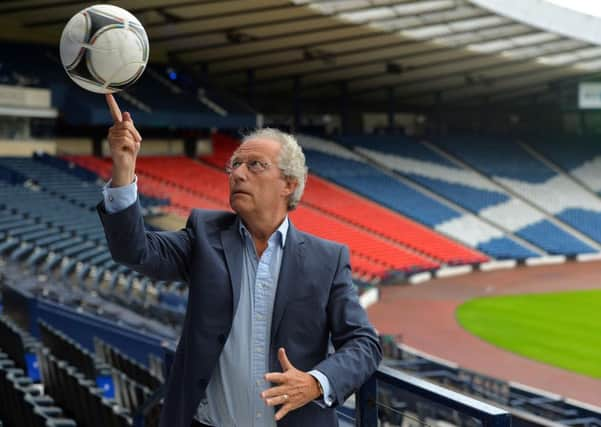Henry McLeish: '˜Emasculated' SFA now has very little power


It turns out the last review, the one meant to change Scottish football for the better, was not so revolutionary after all. It might have been had it been implemented in its entirety. But it wasn’t. In some respects, chiefly the since-conceived Project Brave youth initiative, the opposite of what McLeish recommended, was pursued.
In 2010 McLeish was working in tandem with the Scottish Football Association. Now he has come to realise it is the SFA that is a major part of the problem. Or at least its impotence is. McLeish, prior to an appearance this morning at the Edinburgh Book Festival, believes football has retreated into “a small space, increasingly dominated by a modest club game”.
Advertisement
Hide AdAdvertisement
Hide AdIt’s in stark contrast to Scottish Professional Football League chief executive Neil Doncaster’s recent pronouncement that Scottish football has not been as exciting “since Graeme Souness arrived at Ibrox”. That is part of the problem, according to McLeish. The rich are getting richer. The international side is suffering.
Scottish Football: Requiem or Renaissance? his new book, is published by Luath Press next month. It seeks to challenge those responsible for the “dismal state of the game” and “inspire those who want radical transformation”.
McLeish was once our leading reformist. In total he made 108 recommendations in a two-part review published in 2010. Among them was a proposal that the Scottish Premier League and Scottish Football League join together to form one body. This duly happened in 2013. But this innovation has helped bigger clubs continue to stage a power grab. The 11-1 voting structure in the top tier is still weighted heavily in favour of the big two. “The SFA has been emasculated,” said McLeish. “It has very little power, very little authority and little finance to influence the game. The SFA structure is dominated by the power of a few clubs – our international side and national game can only survive if the SFA has supreme authority over the game in Scotland. To bring success it must be given new authority.
“Power is moving to just a few big clubs. With the nature of society and market place, that’s understandable. It can still be retained in some respect. Celtic and Rangers, Aberdeen, Hibs and Hearts. But there are another 37 clubs on different margins surviving. We need a redistribution of income, power and authority. Five or six clubs are challenging for trophies, 30-odd clubs are trying to survive.”
McLeish rails against an inadequate elite youth programme that has been “derailed and hijacked” by a few clubs. He is chair of the Fife Elite Football Academy based in Glenrothes – the sole regional academy left in the country.
McLeish originally recommended for 20 to be set up in comprehensive schools around the country. Fife remains, for now.
“I feel very angry some great clubs have opted out,” he said. “It is only by having Dunfermline in the set-up in Fife that we are able to continue.” The Project Brave academy structure is the new concept. Clubs were placed in three categories: Elite, Progressive or Performance, with applicants graded on a criteria-based system. Livingston and Falkirk have since withdrawn completely, with the former citing “unsustainable losses” as a reason.
“Why I take umbrage at all of this is in my review of 2010 I wanted a regional academy structure. It did not prevent big clubs from having their own youth development process. But it is simply not happening. We are now applying old solutions to old problems. It is a tragedy.” McLeish retreated to America to complete his latest analysis of the Scottish game. Part memoir, part manifesto, he has not been put off by the limited success of his painstaking 2010 review.
Advertisement
Hide AdAdvertisement
Hide AdThe aim had been to help push Scotland towards qualifying for the 2014 World Cup finals in Brazil. Scots were conspicuous by their absence then and again this summer, in Russia. McLeish noted that Croatia, a far smaller country than Scotland, reached the semi-finals. Iceland, with a population equal to Fife, qualified for their second successive major finals.
“What happened to my review of 2010?” he wonders. “If only I knew then what I know now. I constantly hear from the SFA that they have implemented nearly all of the recommendations. But let’s take Project Brave, which took over from the idea of a regional academy structure. They have not implemented my recommendations. In fact it has gone the opposite way.”
“I was delighted and privileged to do the review into Scottish football,” he added. “But we are now a nation of diminishing football expectations, we have an uncertain future.
“It is not an act of God. It is not a natural phenomenon. This has been made in Scotland by decisions taken collectively as a game. 1998, the last time the men’s team qualified for a major finals, has become hugely symbolic and acts like a shroud over the Scottish game.
“In the last 20 years we have not delivered. Are we any closer to qualifying for a World Cup or European Championship?
“We disappeared, other countries kept moving on. I reject victimhood. This is a crisis made in Scotland by Scots.
“I am obsessive, an optimist. I go around saying I want Labour to win the next election, Scotland to qualify for an international tournament and Brexit dumped. How successful we will be with any of them, I do not know.”